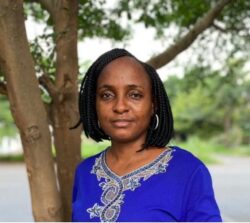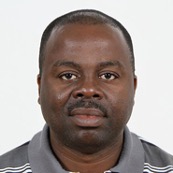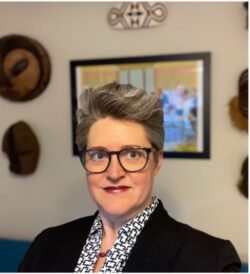RTAC Researchers Strive to Fulfill Nelson Mandela’s Dream
POSTED July 16, 2021
|Democracy, Human Rights and Governance
By Nigel Gibbs, RTAC Communications Manager
The Research Technical Assistance Center (RTAC) celebrates Nelson Mandela International Day, the United Nations commemorative day acknowledging the former South African President’s life’s work. At RTAC, we have chosen to highlight some of our researchers who fulfill the humanitarian icon’s, “Values and his dedication to the service of humanity in: conflict resolution; race relations; promotion and protection of human rights; reconciliation; gender equality and the rights of children and other vulnerable groups; the fight against poverty; the promotion of social justice.” RTAC’s diverse community of scholars are helping to usher in the changes needed to make the world more equitable and just through their research and advocacy for policy change. Professors Damilola Agbalajobi, John Agbonifo, and Jennie E. Burnet all embody the values of Nelson Mandela. Their unique expertise in the fields of gender equity, development, genocide, and conflict in various countries raise important questions about what is needed to fulfil the late South African leader’s vision of a world that embraces dialogue, justice, and lasting peace.
Damilola Agbalajobi, Ph.D.
 Damilola Agbalajobi, Ph.D., is a Senior Lecturer in the Department of Political Science at Obafemi Awolowo University in Nigeria. Her areas of expertise include women and gender studies, economic development, and peace and conflict.
Damilola Agbalajobi, Ph.D., is a Senior Lecturer in the Department of Political Science at Obafemi Awolowo University in Nigeria. Her areas of expertise include women and gender studies, economic development, and peace and conflict.
She felt compelled to become a researcher as she became frustrated in the way in which women are treated, particularly in her home country of Nigeria. Her work as a researcher has brought her to examine 1) Nigeria and the promotion of gender equality in political participation, 2) United Nations’ resolutions and their impact on the role of African women in peace, security and governance, 3) the intersection of gender-based violence and the search for Africa’s sustainable development, and 4) the relationship between gender and governance in Africa. She hopes that through her work, she can help create awareness of the challenges facing women and educate society about the role women can play in economic development. “Having observed that education and research is the most viable tool for women’s emancipation to be achieved, I have taken these areas of research as my special and core interest…the spike in violence against women in politics, violence against women at the domestic level all presents opportunities for seeking solutions to curbing these challenges,” states Dr. Agbalajobi.
Dr. Agbalajobi’s research has taken her to conflict zones throughout Africa. She has examined the way in which violence against women and children in conflict and transition countries has emerged as a major obstacle to building peace, with sexual assault and exploitation of women being used as common tool of war. “The greatest challenge in my field is getting across to my respondents living in conflict and violence affected settings. Sometimes, men respond with derision when questioned on the issues of women’s equality. My work has brought me to troubling areas, especially during the last general election in Nigeria, but this does not deter me.” Dr. Damilola is also part of the team working on Gendered Contentions in Fragile, Conflict, Violence Affected Settings (FCVAS) Research Programme. This international study explores how women’s social and political actions contribute to the strengthening of women’s empowerment and lead to accountability outcomes that promote gender equity.
Dr. Agbalajobi urges leaders to be proactive promote a positive unifying force, as “This was the hallmark of Nelson Mandela despite all he suffered. He came out to accommodate everybody in the new South Africa.” She believes development is hindered in societies marred by violence. In the case of Nigeria, she has found that the country has made, “Giant strides in her democratic journey, but issues such as corruption, ethnic bigotry, leadership failures among other challenges has impeded her progress…[Nigeria] must reduce the level of corruption in order to create a secure society with vibrant youth who are gainfully employed and creative to steer the wheels of governance aright.”
John Agbonifo, Ph.D.
 John Agbonifo, Ph.D., is a Senior Lecturer with the Department of Sociology, Osun State University, Nigeria. His areas of expertise include collective action, energy protests, conflict, United Nations sanctions and international security. His published works include Development as Conflict: Ogoni Movement, the State and Oil Resources in the Niger Delta, Nigeria; Corporate Social Responsibility: An Oversocialized View of Multinational Corporations in Africa; Territorialising Niger Delta Conflicts: Place and Contentious Mobilisation; and Environmentalism and Environmental Movements in Nigeria.
John Agbonifo, Ph.D., is a Senior Lecturer with the Department of Sociology, Osun State University, Nigeria. His areas of expertise include collective action, energy protests, conflict, United Nations sanctions and international security. His published works include Development as Conflict: Ogoni Movement, the State and Oil Resources in the Niger Delta, Nigeria; Corporate Social Responsibility: An Oversocialized View of Multinational Corporations in Africa; Territorialising Niger Delta Conflicts: Place and Contentious Mobilisation; and Environmentalism and Environmental Movements in Nigeria.
Dr. Agbonifo was drawn to research work because of his concern for marginalized and poor people, particularly the plight of the Ogoni people of southern Nigeria. It was at the American University in Cairo did he decide to make the Ogoni peoples’ struggles the subject of his graduate and postgraduate studies. “My work contributes to helping others because it brings their issues to local and national attention [and] serves to encourage others that they are not alone and that there are others who see the wisdom and hope in their struggles,” notes Dr. Agbonifo.
Dr. Agbonifo’s work has brought him to conflict zones in the Niger Delta and post-conflict Sierra Leone, witnessing human suffering caused by environmental degradation, the effects of poor policies concerning the oil industry, and a political economy founded on the exploitation of resource-rich minorities. Dr. Agbonifo states, “Everywhere you find energetic and enterprising peoples, doing their best within very limiting constraints to survive. They subscribe to the goals of their societies, but the means to achieving those goals have either been ‘kicked away’ or do not exist. It is more troubling because while the majority is mired daily struggle of existence, a few elites and their cohorts live in opulence.” In the case of Nigeria, to Dr. Agbonifo, “The vast majority of citizens have lost hope in their country. They desire and do everything to emigrate because they cannot see a bright future.”
To create a fairer and more just world, Dr. Agbonifo believes, “We must have the courage to change, try new things. We must promote equality and justice for all human beings irrespective of the group they belong. We must learn that environmental problems do not respect boundaries…We must find an optimal level or balance that safeguards the wellbeing of everybody.” He points to the fear of the unknown and it being potential undoing of societies. “White beneficiaries of apartheid feared a world shared equally with Black South Africans. But post-apartheid developments have shown that such fear was misplaced. Some believe that human values, lives, and environment must consistently be sacrificed. We must find the political will to undo the yokes of bondage, create level playing social fields and allow people maximize their inherent potentials.”
Jennie E. Burnet, Ph.D.
 Jennie E. Burnet, Ph.D. is an Associate Professor of Anthropology at Georgia State University whose areas of expertise include social change in the context of conflict, genocide, women’s social movements, and women’s roles in democratization and peacebuilding.
Jennie E. Burnet, Ph.D. is an Associate Professor of Anthropology at Georgia State University whose areas of expertise include social change in the context of conflict, genocide, women’s social movements, and women’s roles in democratization and peacebuilding.
Dr. Burnet’s early work as activist in the late 1980s and early 1990s, particularly the 1994 Rwandan genocide, moved her to become a researcher. “I wanted to understand what moves ordinary people—living together in peace—to wreak terrible violence on their neighbors. Since 1996, I have sought to understand this question through research in Rwanda focused on women’s roles in peacebuilding and on the factors that made it possible for some Rwandans to resist the genocide and rescue their neighbors, families, and friends.” Today, Dr. Burnet’s work helps provide strategies that communities can use to confront and move beyond the constraints of violence to build peaceful futures and give policymakers tools to address grievances in the hopes of creating a more peaceful society.
To Dr. Burnet, the greatest challenges to peacebuilding and reconciliation are the spread of firearms and the belief that people are unwilling to change. “In the wake of the genocide Rwanda, courageous civilians, often women, began to reweave the social fabric in some communities. This fragile social trust was often destroyed by violent attacks by armed insurgents or by counterinsurgency operations by the new government security forces. Despite these challenges, ordinary people courageously moved beyond these constraints to build new lives and restore social trust.”
In her experience, Dr. Burnet has found how important listening plays in the path to peacebuilding and reconciliation. “To move beyond violence, people who have experienced it need to recount their stories and be heard by others. Likewise, they need to listen empathetically to other people’s experiences of harm. This process of empathetic dialogue begins the process of rebuilding trust that can lead to cooperation and the search for durable solutions.”
